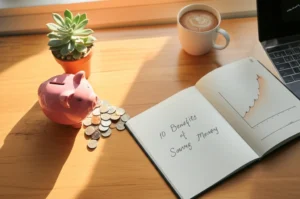So, you’re dreaming about owning a house—the smell of fresh paint, the freedom to hang that weird art you love, a backyard just for you… But then you peek at your bank account and wonder if that dream is just, well, a dream. Here’s the thing many of us don’t realize right away: it’s not about giant leaps but tiny, consistent steps in saving. Those little everyday expenses that slip through the cracks? They can quietly drain your potential down payment fund.
I’ve seen friends who thought “saving for a house” was a distant fantasy, but by swapping small habits and tweaking budgets, they found themselves holding keys instead of wishlists. Trust me, with a little strategy and some frugal love, you can too.
House Budget Reality
How Much Down Payment Do You Really Need?
First off, let’s talk numbers—how much should you really save? The good news: you don’t always need that whopping 20% down payment you’ve heard about on every podcast and blog.
Sure, putting down 20% helps avoid extra fees like private mortgage insurance (PMI), but various loans might let you start with as low as 3.5% down (hello, FHA loans!) or sometimes even zero down if you qualify for special programs like VA loans. That means on a $300,000 house, your down payment might be $10,500 instead of $60,000.
| Down Payment % | Amount on $300,000 Home |
|---|---|
| 3.5% (FHA loan) | $10,500 |
| 5% | $15,000 |
| 10% | $30,000 |
| 20% | $60,000 |
That said, remember you’ll also need money for closing costs (usually 2%-6% of the home price) plus a few extra expenses like moving or minor repairs. It’s not all smooth sailing, but setting a clear goal for your total savings can keep things less overwhelming.
The 28% Rule: Does It Really Fit You?
Here’s a fun (and slightly scary) guideline called the 28% rule. It says you shouldn’t spend more than 28% of your gross monthly income on your mortgage—including property taxes and insurance. Sounds neat, right? But life’s messier than any rulebook.
Think about what else you spend on every month: student loans, groceries, Netflix binges, that weekend coffee ritual, hobbies, or even sock collections. It’s worth asking yourself: Can I comfortably handle 28%? Or do I need to aim lower? Or, hey, maybe a bit higher if it’s doable without sacrificing your sanity.
This is where calming your money stomach happens — balancing want versus need and planning realistically. You wouldn’t buy a pair of shoes two sizes too small, right? Same goes for your house budget.
If you’re currently renting but itching for homeownership, it’s worth checking out some clever pointers on How to save money for a house while renting. Turns out, renting doesn’t mean your house-saving goal has to be on pause.
Frugal Hacks That Actually Work
Cutting Costs Without Feeling Cheated
Here’s my secret: frugality isn’t about giving up everything fun. It’s about smart swaps that don’t make you feel miserable. Ever spent $4 on a latte… daily? That’s over $1,400 a year. Crazy, right?
Start unplugging chargers when not in use, sealing those drafty windows, or adding a water bottle to your toilet tank (really—it saves water slowly but surely!). These little things help your bills shrink without trying too hard.
- Unplug idle electronics to save energy
- Turn off lights in empty rooms
- Use cold water for garbage disposals
- Cancel unused subscriptions (Seriously, how many streaming apps do you really watch?)
- Cook at home more often instead of eating out (savings piles up surprisingly fast)
I did a little challenge once: cut back on take-out just one week. I ended up saving enough for new bedding—and that felt way better than a fleeting food hangover. Little wins add up to big ones.
Budgeting That Doesn’t Suck
Okay, budgets sound scary, like a math test you forgot to study for. But going over your expenses can be less painful when you think of it like a detective game.
You can use easy apps or even a simple spreadsheet to track where every dollar disappears. Then, plug those leaks you find. The trick is to treat your down payment fund like a bill… pay yourself first.
Not sure where to start? Some friends swear by tools like YNAB or Mint, which make budgeting less about restrictions and more about freedom. If you want, you can peek at how people manage how to save money for a house on a low income—sometimes creativity is the best currency.
Speeding Up Your Savings Game
Making More Money (Without Losing Your Mind)
If you’ve squeezed your budget and still want to get there faster, side gigs could be your best friend. I’m talking about freelance writing, driving for delivery apps, pet sitting, or selling that stuff you never use for some extra cash.
What’s cool is you can pick gigs that fit your life and energy—no 80-hour grind required. Plus, think about it like this: a few weekend hustles can transform into your down payment rocket fuel.
Saving Raises and Windfalls: The Lazy Genius Method
Now, this one’s sneaky: every time you get a raise or unexpected bonus, channel it straight into savings. Forget upgrading your phone or that fancy dinner—save first, then splurge guilt-free. Automate your savings, so you don’t even have to think about it.
I did this after my last raise, and honestly, I barely noticed the money missing from my paycheck, but my savings? They started looking like a welcome party for my future home.
Curious about ramping things up? See tips on how to save money for a house fast and watch your timeline shrink.
Where to Keep Your House Money?
Safe and Growing: Picking the Right Account
Stuffing cash under the mattress? Nah, let’s do better than that. Look for high-yield savings accounts or money market accounts. They usually offer better interest rates than your regular bank account, meaning your money grows while you sleep.
Maybe even consider certificates of deposit (CDs) if you’re saving for a couple of years—they keep your money safe and add a bit of earnings. The key is easy access when you need the cash but no temptation to spend.
A quick comparison table might help you decide:
| Account Type | Interest Rate | Access to Funds |
|---|---|---|
| High-Yield Savings | 1.5%-2% | Easy access |
| Money Market Account | 1.2%-1.8% | Some restrictions |
| Certificate of Deposit (CD) | 2%-3% | Locked for term |
The Don’t-Dip Rule & First-Time Buyer Help
You know that emergency fund you worked so hard to build? Try not to touch it for house savings. Mixing the two can be a financial headache. Keep your goals clear and your savings pure.
Speaking of help — check if you qualify for first-time homebuyer grants, special loans, or tax credits. States like California even have specific programs geared towards helping buyers with affordability (how to save money for a house in california is a solid spot to start learning about those).
And hey, if you want a realistic, no-fluff plan, folks have successfully met their goals in a couple of years (how to save for a house in 2 years). Sounds fast? It’s all about smart moves and staying consistent.
Putting It All Together
Here’s the truth: saving for a house feels like a big mountain. But it’s not about scaling it in a day—it’s about steady steps, one at a time.
Start by figuring out what you can afford WITHOUT going crazy. Then, tweak those tiny habits—maybe unplug a charger here, cut a subscription there. Use tools, apps, or even a notebook to track and plan. And don’t forget to earn extra if you can—those dollars count!
Keep your savings locked in a smart account, automate as much as you can, and explore grants or programs that can make the climb easier. Renting doesn’t mean you’re stuck; heck, many have cracked the code on how to save money for a house while renting, and so can you.
So what’s your first tiny step going to be? Audit one expense today. Maybe it’s your daily coffee or that extra streaming service you barely watch. Every dollar redirected is a brick in your future home’s foundation.
And hey, when you’re holding those keys, remember this chat—we took that scary “impossible” and turned it into very doable. Cheers to your new home adventure!













